Gen Z And Mental Issues: Unwanted Best Friends
Reports show that GenZ seems to "suffer" from mental issues more than most generations. Why?
Stress, depression and anxiety (or any other mental problems) can happen to anyone but recent reports are saying GenZ is the most unhappy generation ever, as they suffer from mental issues the most compared to other generations.
They were born in the modern world where they can live a comfortable life with phones on their hands and the whole Internet to talk to, then how could they be so unhappy?
1. Overly Exposed To Negative News
Well, turns out their distress comes from the very source which they are a frequent visitor of: social media.
Gen Z, or Generation Z, refers to the individuals who were born between 1996 and 2005 and has begun to join the workforce. Therefore, their mental health also appears to be something that the governments should care about the most. Seems like GenZ is not doing okay at all: Following a twelve-year period during which individuals aged 15 to 24 were deemed to be happier than earlier generations, recent years have witnessed a reversal of this trend. The depression rate among the youngest demographic has surged by more than 50% between 2010 and 2019 in North America and Western Europe [1].
According to a report written in January 2019 by APA, merely 45% of Gen Z individuals express that their mental well-being is either very good or excellent, as indicated by the American Psychological Association. Comparatively, all other age cohorts showed higher rates on this measure, with Millennials (1981 - 1996) at 56%, Gen Xers (1965 - 1980) at 51%, and Boomers (1946 - 1964) at 70% [2].
Meanwhile, Asian young people are not better in any case: According to the 2023 Study of Mind Health and Well-being by AXA, the younger generation (aged 11-26) represents the age group facing the most significant struggles with mental health issues, such as emotional stress and psychosocial impairment, with a global percentage of 18% and 14% in Asia, surpassing all other age groups.
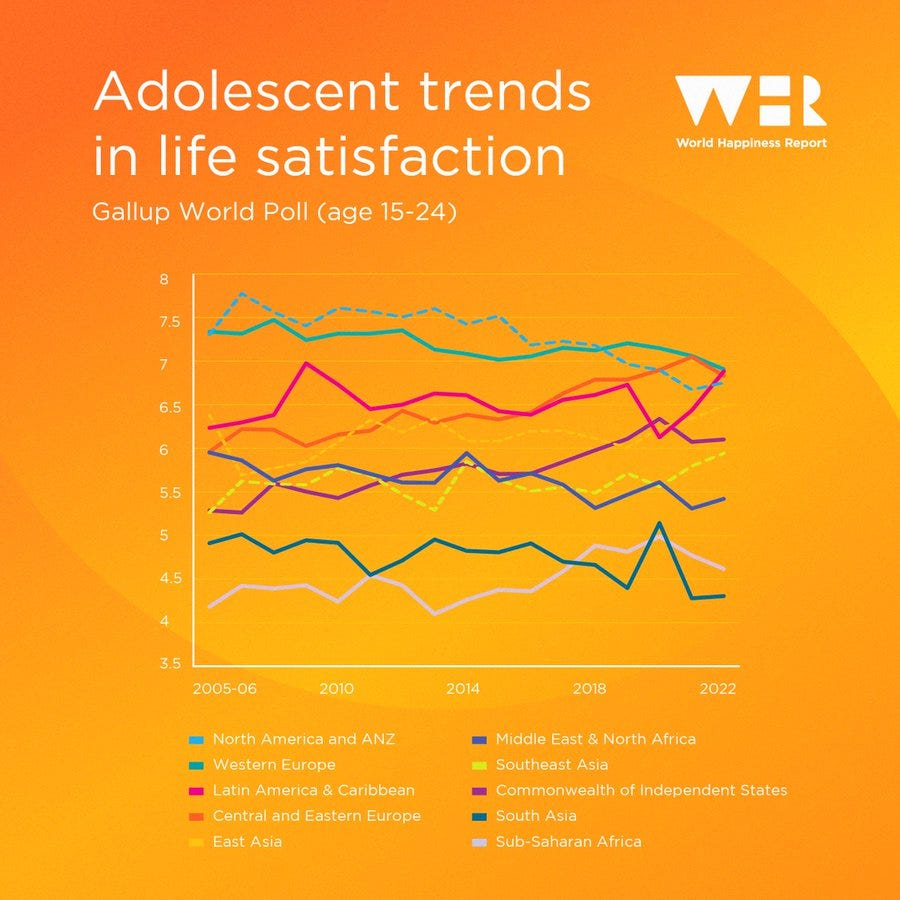
And the events that caused their struggle seem to come from the negative news they are exposed to, if not too much. School shooting, political protests, climate changes, COVID-19 and wars are among the most influential news to young people nowadays. As the social distancing became a thing in 2019, the young adults turned to their devices for their daily activities, including watching global news.
A survey conducted in 2022 shows that half of Gen Z respondents indicated that they rely on social media as their primary source of news on a daily basis, whereas only 13% turn to online news sites [3]. The fact that they are overly exposed to a wide range of news everyday has posed a challenge to their emotional stability. It gradually becomes a habit and has a significant impact on their mental health and well-being, in fact, a recent Dutch study discovered that 21% of youths aged 16 to 30 experience physical symptoms like fatigue and headaches due to climate-related stress. The constant exposure to distressing global crises news, coupled with a lack of influence, fosters a pervasive sense of hopelessness among young people [4].
Why Gen Zers are more susceptible to bad news? Internet space is rife with fake news which spreads like wild fire, especially with the help of individuals who have ulterior motives against others and organizations. Therefore, it’s hard for young people to filter what they get exposed to, the lack of knowledge in specific field might as well contributed to their distorted perspectives over a particular issue.
2. Workplace Stress
Have I mentioned that Gen Zers have just joined the workforce recently?
A Deloitte survey conducted in 2023 with 14,483 Gen Z respondents from 44 countries shows that only 46% respondents admitted enduring persistent anxiety and stress in their workplace. More than a third of respondents express feelings of exhaustion, low energy levels, and mental disengagement from their jobs, primarily attributed to negative work environments or cynicism [5].
Therefore, youngsters are now considering some other alternatives to the traditional 9-to-5 model. Their dream job is basically whatever offers a competitive compensation packages and low stress levels. And it seems like around 44% of Gen Z believe that freelance work and self-employment will offer the path to achieve that.
Along with the advent of A.I. technology, Gen Zers start to experience something called “technology-induced pressures” at the very beginning of their career path, according to Kathleen Pike, a psychology professor at Columbia University and president/CEO of One Mind at Work [6]. Young adults are now facing a new scenario where ChatGPT or any similar A.I. technologies could take their jobs.
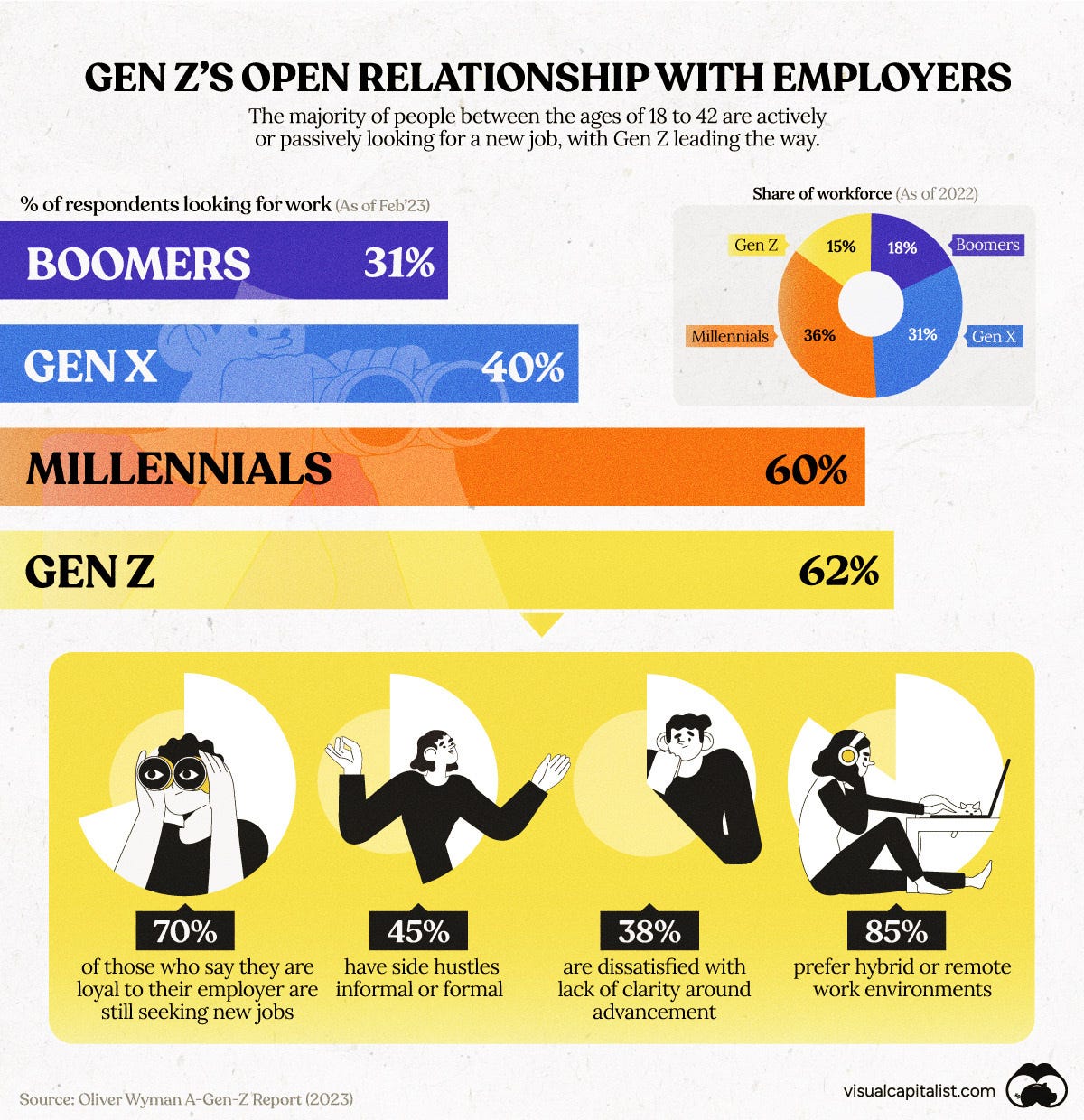
As dissatisfaction in their workplaces continues to grow, some Gen Zers have begun to reintroduce specific boundaries to navigate the new landscape more effectively. This includes adopting strategies such as "act your wage" or "quiet quitting" (working as hard as what they are paid for), essentially to prevent burnout. For the typical Gen Z employee, workplace happiness is closely linked to their level of passion for the work they engage in. Consequently, they are willing to job-hop as soon as they have the chance to do so.
Let’s not forget the fact that Gen Z has entered the workforce during an uncertain period: the lingering effects of the COVID-19 pandemic have left businesses reeling as they struggle to find their footing. Along with the emergence of remote work during the pandemic, rather than observing their colleagues' behavior in the office as a guide to professional life, Gen Z has largely been left to navigate on their own. This lack of on-the-job coaching, coupled with layoffs and the impacts of inflation, has left many Gen Zers feeling unsettled constantly [7].
And so, Gen Z has earned their reputation of being the most unhappy generation at workplace [8].
3. Financial Insecurity
A Deloitte survey conducted in 2022, which involved 14,808 Gen Z individuals born from 1997 onwards across 46 countries, highlighted financial instability as the primary concern among young people.
The survey revealed that 29% of Gen Z respondents cited struggles with living costs. Additionally, 46% stated that their earnings were barely enough to cover their bills, with only 25% claiming they did not worry about their monthly finances [9].

But financial problems are not just Gen Z’s problem, so what makes them stressed over their pockets that much? The uncertainty of their future, that is. As a matter of fact, the surge of massive layoffs from late 2022 through the first half of 2023 has fostered feelings of distrust towards employers and job insecurity among Gen Z. Consequently, data from EY indicates that anxiety levels among Gen Z are at an all-time high [10]. The report also indicates that over 50% of Gen Zers feeling "extremely worried about not having enough money." Given the economic turmoil, fears of a recession, the rise of artificial intelligence, and corporate downsizing, securing a livelihood emerges as a top priority for these young adults.
Meanwhile, some fear making poor decisions that could result in financial loss. Given that approximately 65% of Gen Z employees worked part-time or full-time jobs, with 56% of their earnings came from freelance or "side hustle" work, they simply cannot afford to risk losing their hard-earned money over anything [11].
4. “Phone Phobia”
Sounds weird but it’s true, most Gen Zers feel overwhelmed when they have to start a conversation on phone.
Given the accessibility of smartphones, seemingly attached to almost every young person's hand wherever they are, you might expect Gen Z to handle one of the most mundane tasks: picking up the phone and dialing. However, it is reported that Gen Zers is beginning to develop “Phone Phobia” which refers to the fact they feel overwhelmed at the thought of answering a call. How could they be afraid of something as indispensable as a phone?
According to a research related to the issue, experts believe that this reluctance to engage in phone calls is closely linked to social anxiety, which originates from the fear of judgment or humiliation [12]. In a 2023 Sky Mobile survey, it was discovered that over a quarter (26 percent) of young people within the Gen Z cohort admit to actively ignoring phone calls, while 20 percent find it "weird" to receive calls [13]. Well, “Phone Phobia” is not something new as it has been around for the past few decades, and people still have to get over it somehow as picking up and dialing is something unavoidable, either in personal or professional life. However, it’s getting worse thanks to the advent of technology, as they have more ways to avoid phone calls.
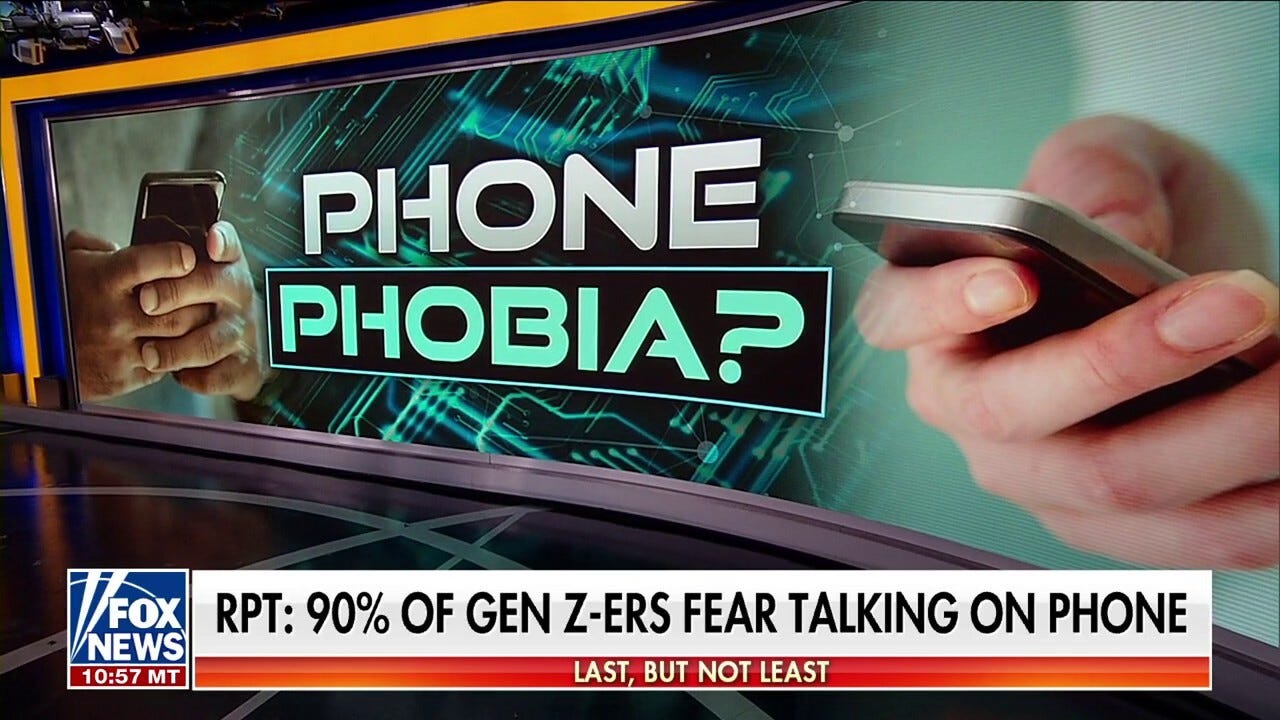
Emails, texts, or direct messages on social media—Gen Z leans more toward texting rather than calling to communicate with one another. This preference arises because texting offers them time to double-check their messages before sending them, and written conversations are easier to keep track of.
Texting also provides them with the opportunity to respond appropriately without awkward silences, helping prevent unforeseen mishaps and eliminating the chances of being judged or humiliated. Additionally, texting is much more convenient, allowing Gen Zers to swiftly send a text and move on while awaiting a response.
As the landlines disappeared and children are getting cell phones at earlier ages than previous generations, the habit of having phone conversations is diminishing among the young adults. The New York Post also has noticed an uprising trend, which they called “a brutal dating trend”, originated from this very phobia: Gen Z actually prefers to breakup over text message [14].
5. Gen Z And The Approach To Mental Health
Despite all the troubles they endure, Gen Zers are somewhat more open about their mental health than anyone, which is a good sign. Growing up with the Internet and social media also grants them a unique advantage: they are more comfortable sharing their personal stories online than any previous generation.
The Internet also provides them a wealth of information on any issues at hand, access to forums, self-help sites, and platforms like TikTok and Instagram. Thus, the online community is increasingly embracing this movement where no topic is considered too private or off-limits. Gen Z, known for their dark, self-deprecating humor and their readiness to share their mental health struggles online, are coming to terms with their mental health concerns, considering it’s just a part of their lives.
Gen Z celebrities such as Billie Eilish, Lili Reinhart or Dove Cameron are also opening up about the experience with their mental health journey, which encouraging the other young adults to relate, share, and learn about their issues. This has helped foster a healthy environment for Gen Zers to feel less alone in their journeys.
There is one thing for sure about this generation: they refuse to let themselves be held back by mental health concerns. Instead, they are constantly seeking treatment, firmly believing that there is a solution for any problems. They strive for better mental health to be able to pursue whatever they wish to do in their life.
⭐Station Shout-out⭐
Feeling clueless about life? Then take a few minutes to tune into this publication with me! Written by Don Boivin, his newsletter is a journey through life where he reflects on his experiences and struggles to find a meaningful way of living, guided by Buddhist mindfulness and meditation.
📜My favorite article: When Anxiety Knocks, Ask For Some ID
Reference:
[1] https://www.nssmag.com/en/lifestyle/36332/gen-z-depression-saddest-generation-ever
[2] https://www.apa.org/monitor/2019/01/gen-z
[3] https://www.statista.com/statistics/1124119/gen-z-news-consumption-us/
[4] https://www.trendsactive.com/2023/10/23/gen-z-the-negative-news-cycle/
[5] https://www.deloitte.com/global/en/issues/work/content/genzmillennialsurvey.html
[6] https://www.indiatoday.in/education-today/news/story/gen-z-most-stressed-at-work-thanks-to-tech-erasing-work-life-balance-expert-2504677-2024-02-20
[7] https://www.businessinsider.com/remote-work-fueling-gen-z-job-anxiety-stress-mental-health-2023-12
[8] https://www.fastcompany.com/90879257/gen-z-happy-workplace-gen-x-millennials-boomers-study
[9] https://e.vnexpress.net/news/trend/high-earning-gen-z-still-has-empty-pockets-4713517.html
[10] https://www.ey.com/en_us/consulting/generational-dynamics/2023-gen-z-study
[11] https://www.forbes.com/sites/jackkelly/2023/09/29/gen-z-faces-financial-challenges-stress-anxiety-and-an-uncertain-future/?sh=49e6fc534f14
[12] https://www.liebertpub.com/doi/pdfplus/10.1089/cpb.2006.9936
[13] https://www.skygroup.sky/article/call-declined-
[14] https://nypost.com/2023/07/10/gen-zs-aversion-to-phone-calls-has-created-a-brutal-dating-trend/







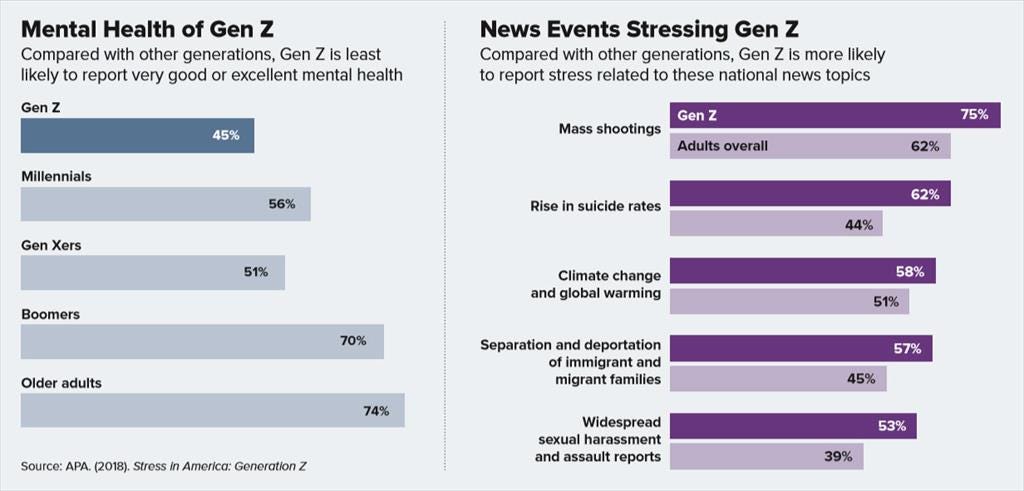
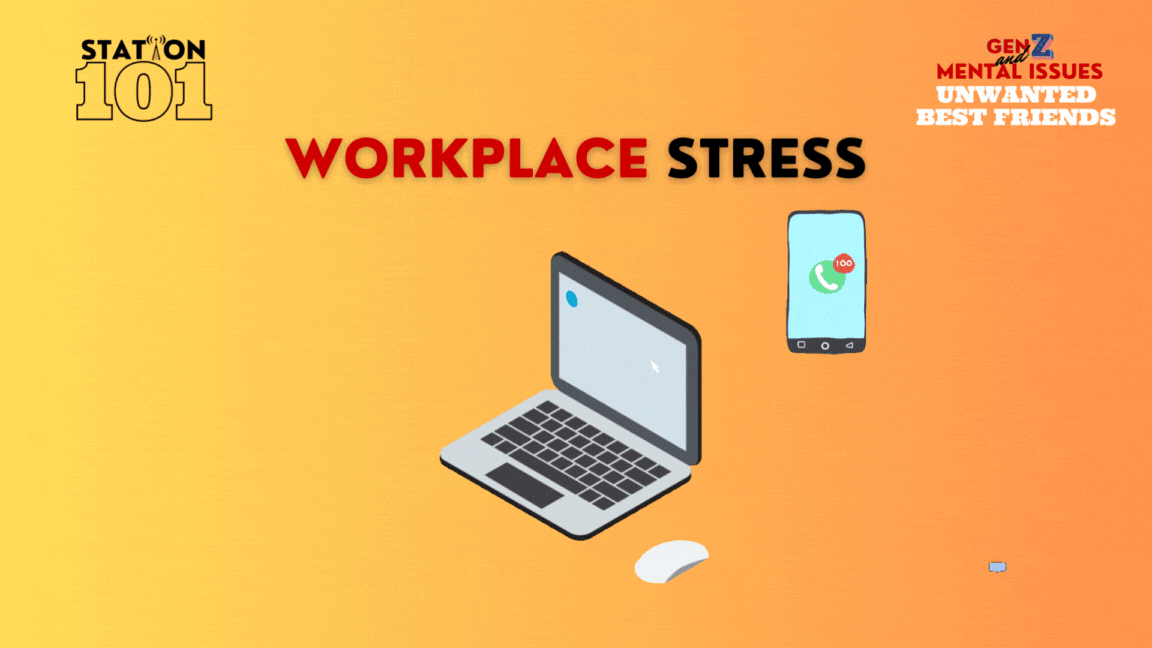




Professional writing for a hobbiest!
We've had anxious generations before, so my advice to Zoomers is to own their anxiety and realize they'll be a great generation anyway:
https://mikegoodenowweber.substack.com/p/hey-zoomers-youre-going-to-be-a-great